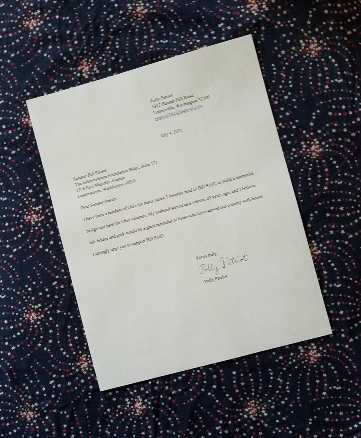 An important part of government “of the people, by the people, and for the people” is that the people should let their voices be heard, whenever needed. Government and media left entirely to themselves can become too powerful. They must feel accountable. In the last couple of years I have tried to increase my communications to politicians and media and to get some Letters to the Editor published. I’m hoping that many more citizens will try to let their voices be heard. I’ve gradually learned a few things I would like to pass on.
An important part of government “of the people, by the people, and for the people” is that the people should let their voices be heard, whenever needed. Government and media left entirely to themselves can become too powerful. They must feel accountable. In the last couple of years I have tried to increase my communications to politicians and media and to get some Letters to the Editor published. I’m hoping that many more citizens will try to let their voices be heard. I’ve gradually learned a few things I would like to pass on.
One important arm of government that needs accountability and Christian influence is the local school board.
They are greatly affecting the lives of the children in ways that could have long-term effects. Local school boards are responsible for hiring a superintendent, setting policies, choosing curriculum, planning a budget, and taking care of issues with facilities. That’s a lot of responsibility. The Portland Public Schools Board of Education consists of seven board members representing various parts of the city. One of them will serve as Chairman. Research tells me that school boards usually have anywhere from five to nine members. Some school board members are paid positions, but I found that in Portland they are volunteer positions. It’s always important to make sure your communications are respectful, even though firm and passionate. It seems all the more important when addressing volunteers who donate many hours.
Legislative Facts
In Oregon, the Legislature convenes in February. In odd-numbered years they are in session for no more than 160 days, or about 5 months. In even-numbered years they are in session for no more than 35 days. Sometimes special sessions are called. While they are not in session, they may be doing work with constituents, researching, or collaborating on the substance of bills. They are currently (as of spring of 2021) paid a yearly salary of $32,800, but they are planning a hearing for consideration of raising it to about $55,000 per year. They are also paid a per diem of $151 for each day they are in session. (It is said that because of the current moderate salary and the fact that the time spent on legislature interferes with having another job or business, the legislators end up to be from a limited sector of society, such as retirees or those who have income from investments.) There are currently 30 senatorial districts in Oregon, each having about 127,700 people, with one senator for each one. There are 60 congressional (representative) districts in Oregon, each having about 65,000 people, with one representative for each one. Senators serve four-year terms, whereas representatives serve only two years at a time. Other states’ sessions, salaries, number of legislators, etc., may differ greatly.
days, or about 5 months. In even-numbered years they are in session for no more than 35 days. Sometimes special sessions are called. While they are not in session, they may be doing work with constituents, researching, or collaborating on the substance of bills. They are currently (as of spring of 2021) paid a yearly salary of $32,800, but they are planning a hearing for consideration of raising it to about $55,000 per year. They are also paid a per diem of $151 for each day they are in session. (It is said that because of the current moderate salary and the fact that the time spent on legislature interferes with having another job or business, the legislators end up to be from a limited sector of society, such as retirees or those who have income from investments.) There are currently 30 senatorial districts in Oregon, each having about 127,700 people, with one senator for each one. There are 60 congressional (representative) districts in Oregon, each having about 65,000 people, with one representative for each one. Senators serve four-year terms, whereas representatives serve only two years at a time. Other states’ sessions, salaries, number of legislators, etc., may differ greatly.
If you are an Oregonian, you can easily find the State Senator and Representative that represent you by entering “Search for your Oregon legislators oregonlive.com” in your search engine. To find the contact information, enter “contact info” and the senator’s or representative’s name in your search engine.
Tips to remember when communicating with legislators
- If you are writing in regard to a proposed bill, refer to the Bill # or title.
- Be as concise as possible.
- Use facts and/or logic to support your case.
- Specify what action you desire from the legislator.
You needn’t always request action. It’s good to sometimes send a brief thank you to a legislator for their strong support of an issue important to you or just for being a bold leader serving with hard work and integrity.

When it comes to finding contact information for your national legislators, you can enter “How to contact your elected officials” in your search engine and look for the USA.gov website. On the website, click on “Locate your U.S. senators’ contact info.” Then click on “Find your U.S. representative’s website and contact information.” It will ask you to enter your address to find your representative’s information.
There are “generic” U.S. Capitol Building addresses for the small offices assigned to U.S. Senators and Representatives in the Capitol Building. Then there are addresses for their offices elsewhere in Washington, DC. If you go onto their individual websites, you will find other office addresses located within your state. I have heard that letters by U.S. mail are somewhat delayed by the process of being scanned for harmful materials, but I’ve also read that letters are more effective than e-mails or phone calls. Sometimes time is of the essence, if they are about to take a vote. Often, rather than supplying an e-mail account number, there will be a box for you to type your e-mail message on their website. There may be a limited number of words allowed. If you decide to make a phone call, call their larger DC office, where their staff is located. You may also be connected by the Capitol Switchboard. Be prepared by writing some notes. Ask to speak to the assistant who is handling the issue about which you are calling. Identify yourself as a constituent. See the “tips to remember when communicating with your legislators” above. It’s important to be as brief as possible, since they work long hours. Be sure to thank the staffer who took your call. Representatives and senators have the month of August off.
It may be helpful to know how a bill is passed into law, so you can follow it more easily. On the House.gov website, I found a summary of how a bill becomes a law:
- A representative sponsors a bill.
- The bill is assigned to a committee for study.
- If released, the bill is placed on a calendar to be either voted on, debated, or amended.
- If passed by a simple majority of at least 218 out of 235, the bill will move to the Senate.
- The bill is assigned to a Senate committee.
- If released, it will be debated and voted upon.
- A simple majority of at least 51 out of 100 will pass it.
- A conference committee of House and Senate members works out differences between the House and Senate versions.
- The revised bill is sent to the House and Senate for final approval.
- The Government Printing Office prints the revised bill.
- The President must sign or veto the bill within 10 days. [A veto can be overridden by a 2/3 approval by the House and Senate.] You can find out the status of a bill at the govtrack.us website. Find the bill in the listing and click on it for the history of the bill.
The mainstream media has earned criticism for their reporting in recent years, and they need to know that American citizens want honest reporting. Whenever we see inaccurate or biased reporting, they need to hear from us. For instance, I caught a news broadcast still reporting that five people were killed in the Capitol riots (they usually call it “insurrection”) of January 6th. It had already been proven that the only person who didn’t die of natural causes was the woman involved in the rioting group who was shot by a (unidentified) policeman. I e-mailed them to ask that they quit giving that false report. Sometimes it isn’t about what they say, but what they don’t say. When they have ignored an important story (sometimes due to bias) we need to let them know that we expect them to cover all important stories. According to a 2020 article on the techstartups.com website, only six corporations own 90% of American media outlets. A 2020 article on the intpolicydigest.com website tells us that the big conglomerates that own much of our media also have ties to the Chinese market. We can just abandon watching or listening to the mainstream for other options, but they will still be influencing others. Even if we personally look to other sources, we can still help hold the mainstream media accountable. You may also want to contact the networks about programming. For instance, you may want to complain about the morals exemplified in some of their shows, or their attempts to covertly use the plots of certain shows to push a political agenda. On the other hand, it’s good to thank them for shows with good family values or special reports fairly presented.
 Letters to the Editor
Letters to the Editor
Another way to let your voice be heard is by means of “Letters to the Editor” for your local newspaper. I’ve been trying my hand at it somewhat in the last couple of years. I’ve probably written about half a dozen to The Oregonian, but only two have been printed. In large papers there is a great deal of competition, so don’t be disappointed if they don’t print your letter. Remember that at least one person on the editorial staff probably read it. You never know if a little seed thought may have been implanted in their mind. With The Oregonian, the article becomes their property, and they can edit it for corrections or brevity. You can mail it in, but e-mail is simpler for me. They prefer that you put your letter in the body of the e-mail, rather than an attachment. They require your name, address, and phone number for verification, but they will only print your name and the city where you reside in the paper. Their maximum number of words allowed is 250. Be sure to follow all the guidelines of your own local paper, to prevent having your submission set aside due to a technicality. Although your submission may become their property, that doesn’t mean you can’t write on the same topic in a different way.
Here are some tips that may make you more successful in your attempts to get your Letters to the Editor published. These ideas came from the freedomforthepeople.org website:
- You can lend support or expand on a subject recently covered in the news, or give an opposing viewpoint or a correction to a current news story, editorial, or letter from another reader.
- Use logic, emotion, and facts from original sources.
- Keep your writing concise.
- Ask for a concrete action, when appropriate.
- Recommend a resource for further information, when appropriate.
- For small newspapers, you may make a courteous phone call in 4 to 7 days, to ask about the status of your letter. This is not a good idea for large newspapers.
I decided I needed a file to keep copies of my letters and e-mails to political leaders, and one for my Letters to the Editor. I also made a file for newspaper articles of interest, that have topics I may want to address. You could print off internet articles from your computer, too. If I write in reference to an article, I attach the article to the back. If I receive a response to an e-mail or letter or I’m successful in getting a Letter to the Editor printed, I attach it on top. My file is becoming difficult to thumb through, so I plan to make separate files for local, state, and national political leaders, and one for media.
Right now we urgently need to let our voices be heard. Even if our nation gets back on a path of strong morality and freedom, we must still let our voices be heard from time to time. As I have quoted before, “The price of freedom is eternal vigilance.”
I found that I could save time and make it much easier to “let my voice be heard” if I kept sheets with contact information for political leaders, networks, etc. It can be a little time-consuming to look up the contact information, with each website being set up a little differently. Once you have found the information you need, you could save the information to make your next communication quick and easy. To make it easier for you, I have made up some sheets you can fill in.You may want to just fill them out as needed. You could fill them in with pencil, so changes could easily be made. If you don’t have a printer, you can just make up your own sheets. Information will need updating from time to time, such as when candidates beat incumbents in the election. In Oregon, an additional U.S. Representative will soon be added and new district lines drawn, due to an increase in population per the 2020 census.
Links to Help Your Voice be Heard
To help you track your contacts that you make, see the following contact sheets.
To see a printable copy of the LOCAL SCHOOL BOARD contact info sheet, CLICK HERE.
To see a printable copy of the LOCAL POLITICIANS contact info sheet, CLICK HERE.
To see a printable copy of the COUNTY COMMISSIONERS contact info sheet, CLICK HERE.
To see a printable copy of the STATE POLITICIANS contact info sheet, CLICK HERE.
To see a printable copy of the NATIONAL POLITICIANS contact info sheet, CLICK HERE.
To see a printable copy of the LOCAL MEDIA contact info sheet, CLICK HERE.
To see a printable copy of the NATIONAL MEDIA contact info sheet, CLICK HERE.






Leave A Comment